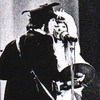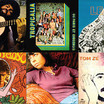Ilumencarnados seres

haroldo de campos
Testimonials
To what concerns the acceptance of what is new, Brazil (and not only Brazil) has always been conservative, even reactionary, before inventive information that escapes from the redundancy standards to which the audience is familiarized and conformed. I consider the Tropicalista movement a very important phase of the Brazilian popular music, fundamental indeed, because of its contribution in terms of innovation and experimentalism.
The most radical album of Tropicalismo, in terms of “cannibalizing” experiences, both the poetic (lyrics) and musical ones (the latter nurtured, partly, by the inventive tendencies of the new classical music) was, doubtlessly, ARAÇÁ AZUL by Caetano.
I believe the Tropicalistas, through the “concrete poets”, got informed about Oswald de Andrade, Sousândre (the most extreme and resourceful poet of our Romanticism, whom Augusto and I made available again to readers) and others from abroad, like Joyce, Pound, E.E. Cumings, Mallarmé / Un Coup De Dés (all of them translated by us). It also seems to me that, belonging to a younger generation, they might have been influenced by the Concrete Poetry’s theory and practice.
The first to establish contact with the Bahians was Augusto, who, besides being a poet, is a musicologist (see his pioneering book O Balanço da Bossa) and may have been the first (or one of the very first) critic to proclaim and defend the importance of the Bahians in terms of MPB renewal, initially, in his articles published in São Paulo and Rio’s newspapers.
I had a closer contact with Caetano and Gil when they were exiled in London. I was their guest in Chelsea’s “Capela Sixtina” after I suffered a car accident. We talked a lot. I read, upon their request, fragments of Galáxias, heard their new songs (the ones from the London phase) and introduced them to Cabrera Infante and his beautiful and extremely delightful wife and muse Miriam (Caetano read Três Tristes Tigres from the copy of a book I lent him). From this period are the reminiscences which years later eventually resulted in the song CIRCULADÔ (whose lyric is extracted from segments of the mentioned Galáxias). I immensely like this song by Caetano and the way he assembled the galactic fragments.





















